All images courtesy of Vinny Appice
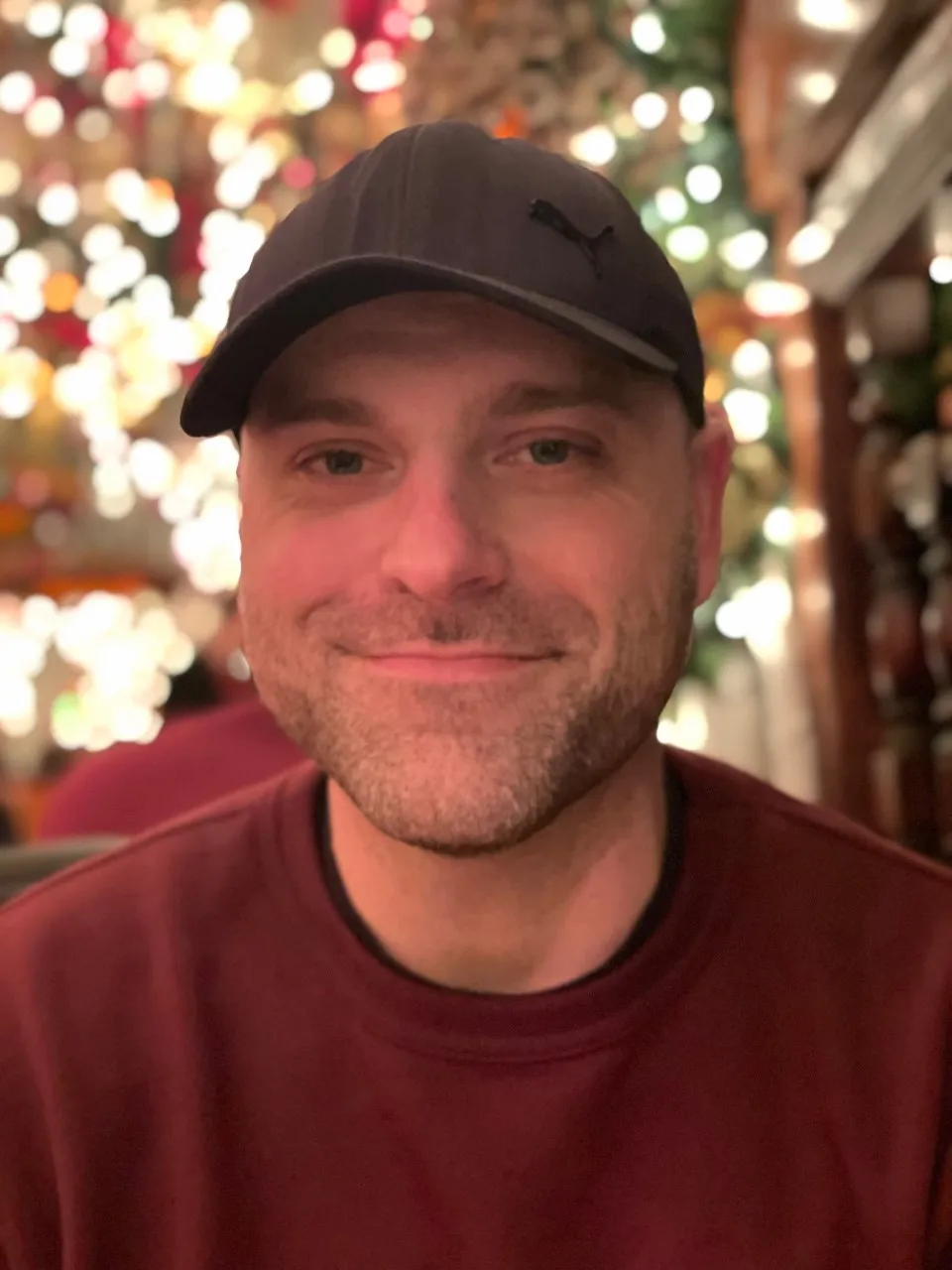
By Andrew Daly
andrew@vinylwriter.com
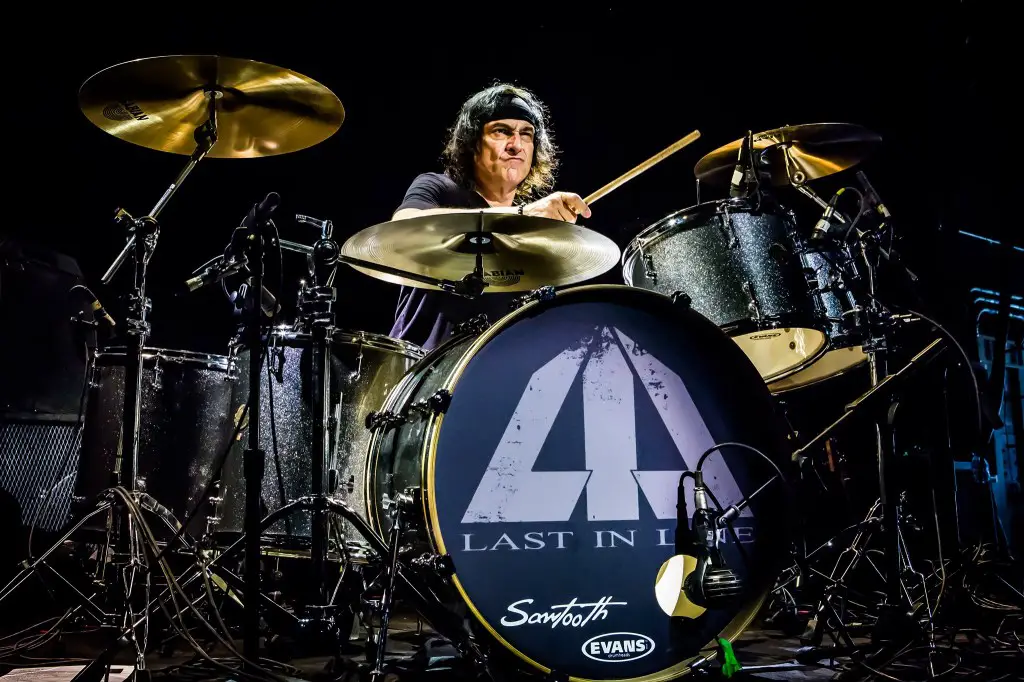
From the streets of Brooklyn, New York, to the grandest stages in all of rock and heavy metal music, Vinny Appice’s legacy is as far-reaching as it is awe-inspiring.
Aptly known as one of the heaviest, hardest-hitting, and menacingly furious drummers in heavy metal history, Vinny Appice’s speed-laden, molten lava stickwork has served as the bedrock for some of the most transcendent albums in rock history.
Appice is perpetually sought after, and with good reason, albums such as It’s A Circus World, Mob Rules, Dehumanizer, Holy Diver, The Last In Line, Sacred Heart, The Devil You Know, and dozens more are definitive recollections which are demarcated and accented by Appice’s signature prowess behind the kit.
With both Black Sabbath and Dio, Appice stood tall, exploding the eardrums of a generation of adoring listeners, but Appice’s greatest achievement may well be his dedication to teaching, which is dutifully served by his steadfast allegiance to his craft.
To say the music Appice has been a part of is seminal would be an understatement, and to say Appice is influential would be redundant. Vinny Appice’s multifaceted legacy brought forth through a groundswell of heavy metal thunder is the “stuff” of legend, and the proof is in the pudding, as Appice’s work, in all facets, and phases, is still highly relevant to this day.
I had the pleasure of digging in with Appice, where among other things, we touched on his latest project, Scream Taker, his ongoing talk show Hangin’ & Bangin’, the influence of his brother Carmine, his legacy as it pertains to Black Sabbath, Dio, and a whole lot more.
Andrew:
Thanks for setting aside some time, Vinny. I wanted to hit on your most recent musical endeavor first, Scream Taker, which includes Jim Crean and Steph Honde. What can you tell us about it?
Vinny:
Well, that was with Jim [Crean], who my brother Carmine and I do shows with. And I’ve worked with Steph before on a couple of his albums too. So, they were writing some songs, and then they got me involved, and we put together a really great album. We’re trying to get it to the point of playing live, but it hasn’t come to that yet. It’s just a really cool album, and it’s a really heavy album, with good songs, and good performances. We’re excited about it, and maybe we’ll be able to go on the road with it. We’ll see.
Andrew:
When it came time to record, did you just come in and lay down the drum tracks, or did you have any input in regards to the songwriting process as well?
Vinny:
Jim and Steph sent me the tracks, and then with a couple of the songs, I rearranged some things on them. But as far as the drum tracks, I have a studio in my house, so I’m able to import the files, and then lay down drums. I really like doing it that way these days, because I can fine-tune what I want to play and what sounds I want, without having to be in the studio, and being in a rush. So, I did have some impact on the direction of the songwriting, but mainly, it was Jim and, Steph.
Andrew:
You’re known for working on a lot of different projects at once. How does your approach to recording your drum tracks change from project to project?
Vinny:
Well, the big change came when I started doing this at home because I realized that I’m in control. I’m the drummer, but I’m also the engineer, and I’m also the maintenance guy when something goes wrong. [Laughs]. I used to go to a friend’s studio when I had a project to do, rent it out for a day or two, and I’d do a bunch of songs at once. But now, at my own studio, with me being in total control, I can do it at my leisure. I can just keep playing with the PA, and punch into the spot and fix it when it doesn’t sound right, you know? I can just keep messing with it until I lock it in. I call it granular, where I can really get in there deep into patterns that I don’t like, and I can alter them on a finite level. This has become like a godsend, and years ago, we never played with clicks when I was Sabbath and Dio. But with this kind of thing, you have to play with a click most of the time, but I’ve been playing with a click for such a long time that I don’t even hear the click anymore. These days, I just know when I’m in time the with the song and all that. So, I love doing things this way now, it just gives me so much control over the tone, the playing, and the performance. It’s great.

Andrew:
One of your many ventures with your brother Carmine is Hangin’ & Bangin’. I wanted to touch on what sort of freedom that gives you that perhaps recording music doesn’t.
Vinny:
Well, it’s a whole different thing. You know, we’re used to playing gigs, which no matter where it is, it’s usually the same kind of thing where we know what to expect. It’s kind of like the same thing happens: you go there, you check the equipment for it’s yours, or it’s not yours, you soundcheck, and finally, the performance. It’s maddening. [Laughs]. So, Carmine and I, we’re used to dealing with that, and then this show comes along, and it’s like a talk show. Carmine came up with it, Ron Onesti is the host, and it’s something totally different. It’s really cool because some of the guests have these great stories about some of the music that was created as part of rock history. For me, beyond the show, sometimes I’m just kind of sitting there listening to this, and I’m like, “Wow, this is really cool,” almost like a fan. [Laughs]. So, it’s a whole different animal.
I liken it to the 80s, back when I started doing drum clinics because that was a whole new ballgame too. Sabian put on the first clinic I had, and they offered me like six clinics on a little tour, and at first, I was like, “I don’t know if I want to do this. I’m used to playing with the band, and being on the road.” So this was something different, but I like to take on challenges, so I agreed to do it, and I had a great time. I did one, and then I did two, three, four, five, and six, and I got through those, and I got really comfortable with it. Now, I love doing clinics. There are not a lot of them these days, but I actually get to put one on via Facebook every Tuesday at 4 pm, California time. I do a drum stream for an hour, and that’s sponsored by my drum company, which is called Sawtooth Drums and Chromacast Hardware. It’s like a clinic every week in my house, where I stream, I answer questions, I teach, and I play music. It’s really cool, and it’s fun to do different things, otherwise, you end up in a boring routine of doing the same thing over and over. This way, I get to learn how to approach different projects.
Andrew:
I think that’s one of the great things about both you and your brother Carmine, where you both have been such big proponents of the drums. I think the clinics that you both do, coupled with how visible you both are through so many avenues have really continued to inspire young drummers in many ways.
Vinny:
Yeah, well, it started with Carmine back in the day when he was with Ludwig Drums, and they booked some symposiums in Florida, like big music symposiums. They booked him on that, and after that, he started getting into teaching. From there, he had a little drum school in Long Island, New York back in the day, so he was always teaching when he could. And he wrote a great rock book called Ultimate Realistic Rock Drum Method too. I was eleven years younger than him, and not only did I get inspiration from the way he played with Vanilla Fudge, and all the success he had, but I also got inspired by his teaching. It was this is a whole other area that was different than being in a band, and just playing songs, so I was very inspired by that.
So I practiced a lot, and as years went on, then I started doing drum lessons in the neighborhood. And then I wrote a book called Rocksteady, which you can’t get anymore, and then I got into the clinics, and teaching became part of my career. I loved it – I still love it – and I still do some lessons online with a couple of people through zoom, and it works. It sounds okay, and I’m able to share the knowledge that I have. You know, it’s funny to hear things sometimes, I’ll be showing some of my licks, and then it’s funny to hear this young kid playing my lick back to me. That always makes me laugh, it cracks me up a bit. So, I love teaching, and both Carmine and I, we’re two of the few drummers from way back when that got into that part of the business.
Andrew:
Another component to that is the Drum Wars, which is a really cool project that you and your brother have gotten into. You alluded to Carmine’s influence earlier, but you have a very distinctive style that’s entirely separate from Carmine’s as well. How do your different styles complement each other, and how do they differ? And how does that lend itself to the incredible show that Drum Wars is?
Vinny:
Well, first of all, we’re gonna do some dates in August, and we’re going to change the name to just the Appice Brothers because when we advertise as Drum Wars, people tend to think it’s a drum clinic. [Laughs]. They think that even though it says it’s with a live band playing the hits of our collective histories, and blah, blah, blah. It’s a really great show, and we’ve usually got about thirteen or fourteen songs in there, with a couple of mini drum duets and stuff, which are really cool, and even some comedy. But when we play together, we can sound very similar to each other, and it’s almost like one monster drummer. But then our styles are different, which I think mainly is because there’s an age difference between us of eleven years. You know, Carmine and I grew up listening to different drummers. Carmine grew up listening to Gene Krupa because when he started, there wasn’t a lot of rock ‘n’ roll out there, especially in terms of drummers. So he tended to play more like a Gene Krupa style, with a lot of melodic playing, grooves, and things like that. And while Carmine listened to Buddy Rich and all that, I kind of grew up on Buddy Rich, John Bonham, and my brother, of course, so I went into a different kind of style. And then, when I started playing in bands with Rick Derringer, and with my band called Axis, I furthered that. I was into heavier music, and it was perfect because I wound up in Black Sabbath and Dio. My style fit really well with those bands. Carmine wasn’t really playing heavy metal until he played with Ozzy for a bit, which was the only time where he touched on playing some heavy, dark music to that point. He was more melodic stuff, he played with Rod Stewart and Vanilla Fudge. Cactus was a heavy band, but more of a hard rock band as opposed to heavy metal. We just developed different styles, which is good, because I didn’t try to copy him. Maybe when I was younger I did a bit, but I found my own way pretty quickly. It would be boring if we played the same, you know, “Oh, here’s Vinny. He sounds just like Carmine.” [Laughs]. I think that now, we definitely have unique styles, which makes it cool. It makes it cool for our shows, and for our audiences when we play together.
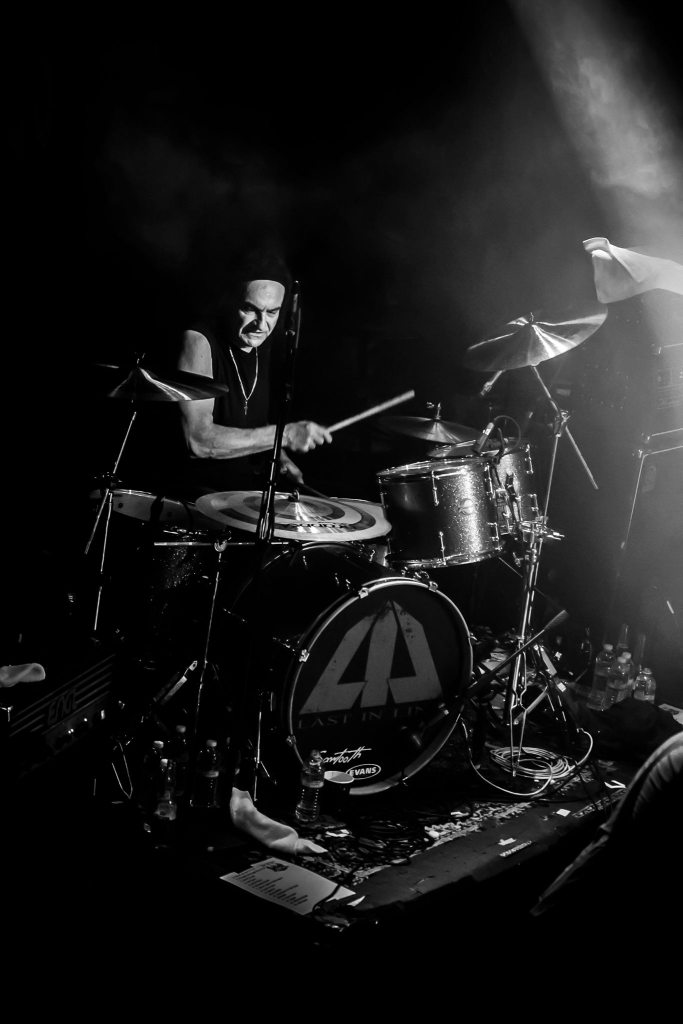
Andrew:
You mentioned Ozzy and Sabbath, and so I’d like to pivot in that direction. Now, if I remember correctly, earlier in the year, there were a whole lot of different rumors going around regarding you being offered a role with Ozzy Osbourne, and you ultimately turned it down. Can you clarify that for me?
Vinny:
Of course. So, yeah, I got a call from Sharon Osborne, and she told me, “We’re putting a band together around Ozzy. Right now, Ozzy is in England, and he heard about you. We’re willing to fly you to England, and have you hang out with Ozzy.” Basically, they wanted to see how I got along with him, and the guys, and if it would work. The thing is, I was really young. I was probably nineteen, or twenty years old, and I had heard crazy stories about Ozzy, God bless him. [Laughs]. So, I asked my brother, and I said, “Carmine, I got an offer to go play with Ozzy in England. What do you think?” Well, Carmine said, “Yeah, I confirm that he’s pretty crazy.” Carmine went on to tell me some stories, and basically, he said, “The last time I was with him, we were at the Rainbow Bar and Grill in Hollywood, and we were having a drink and eating. Someone called me, and I turned my head, well, when I turned back around, Ozzy was passed out in his plate of spaghetti.” So, I was like, “Okay. Maybe I shouldn’t do this.” [Laughs]. It’s so hard to remember, but those are the main reasons that I didn’t take that offer.
But then, luckily, a couple of months later, I got an offer from Sabbath while they were in L.A. They needed a drummer right away. So I went down and met Tony Iommi, and it worked out really well. Tony and I got along great, and he invited me down the next day to play with the band, and see how it goes. I remember they only had like four total days before the tour picked up again because Bill Ward had just quit during the Heaven and Hell world tour. So, it worked out good, and then my relationship with Ronnie was incredible. We got along so well, we became like brothers and that led to Dio down the road. It’s crazy to think about now, but me passing on the Ozzy gig, it was a good move in that way. That was a good move for me, for a lot of reasons. But either way, Ozzy lasted a long time too. His career was on top forever. It still is, you know?
Andrew:
Obviously, you’re a much different drummer than Bill Ward. Going in, what was your approach to learning the tracks on such short notice.
Vinny:
I had to listen to those songs a lot. [Laughs]. I had to pick up on what Bill played, and I tried to play like Bill in some spots, but in other areas, I just played like me, because that’s what I felt. Bill has a very unique style, and approach to the songs. Luckily, I listened to him when I was young, as he was one of my heroes. But it was hard, and we didn’t have a lot of time for me to sit there, and try to get the parts down exactly right for every song. That just wasn’t going to be possible, it was too much to ask when I had to learn like fifteen songs in four days. And the first day of rehearsal was very short because they were so happy that they found a drummer, so everybody went to the pub to have some drinks, and I was stuck at the rehearsal studio, going over the stuff with Geoff Nicholls the keyboard player. [Laughs]. So, what I did is I just split it up where I got the main parts that Bill played, and then I would just play the rest of the parts in my own way. I had to do it that way, it was the only we could get going and get back on the road. I had cheat sheets too. I wrote out these cheat sheets for each song and I had a book with them all in it, and I managed to pull it off.
After a while, it got better and better and better because we got used to playing together as a band. And then it became really tight, and I learned how to really play behind the beat from playing with Tony and Geezer because Tony doesn’t really want to rush too much. You know, with those Sabbath songs, a lot of them are slow, they’re bright in the pocket, and then they slow down sometimes. I was aware of that, and I honed it by keeping my ears open. That’s one great piece of advice I can give: Always keep your ears open. When you’re playing with a new band or a new musician, check out what they’re doing, check out how you can fit in. So that’s what I did. And then we became a real band from being on the road together, and we went in and recorded “The Mob Rules” for a movie called Heavy Metal. We recorded that at John Lennon’s house in England when it was owned by Ringo because John passed away. Well, the track came out so good, when we finished, everybody was like, “Whoa, this is the shit.” It was loaded with energy and was a fast song.
I kind of gave a little bit of new blood to the band, I brought new energy. So from that point on, we knew we had something, and from there we were recording the whole Mob Rules album. It wasn’t just me though, Ronnie changed things too. With Ronnie in the band, that changed the vocals and melodies, and Black Sabbath really became a different band. I mean, they didn’t bring Ronnie in to sound like Ozzy, and to do more albums that sound like the Ozzy era. So it was the same with the drums. They didn’t bring me in to sound like Bill Ward. And by putting new blood into it, it changed the band a little bit more, which is fine. It was great for Black Sabbath. It was a new life, with a band.
Andrew:
My personal favorite era of Sabbath is your era with Ronnie James Dio. That might be an unpopular opinion, but nevertheless, I love that era. When you decided to follow Ronnie out of Sabbath, was there any nervousness that came with leaving an established act like Sabbath?
Vinny:
No, not at all. Actually, at that point, Tony, and Geezer wanted me to stay with the band because we were a unit. At the same time, Ronnie had said to me, “I’m going to put together my own band. I’m not happy. That’s what’s going on.” It was a business thing between them, that’s what it came down to. So Ronnie said, “I’m gonna leave. I’d like to put a new band together, and I’d like you to be part of it playing drums in the band.” You have to remember that I was really young. I was like in my very early twenties, so it was not a big decision for me. I was like, “This sounds exciting. I’ll be playing with this amazing singer, who’s already got a fan base.” It wasn’t something that I thought, “Well, if I do this and it fails, I’m screwed.” Because with Dio, it wasn’t a new band of unknowns, this was Ronnie James Dio. I thought about it, and I figured, “I think this will be cool. I’m gonna go for it.” Plus, Ronnie and I got along so well, and we lived very close together in California, so it was easy to work together. Tony and Geezer lived in England, which did make things hard, so it was kind of a no-brainer where I said, “I’m going to check this out with Ronnie and see what happens.” And that’s how we put started to put Dio together. Honestly, it was an easy decision for me.

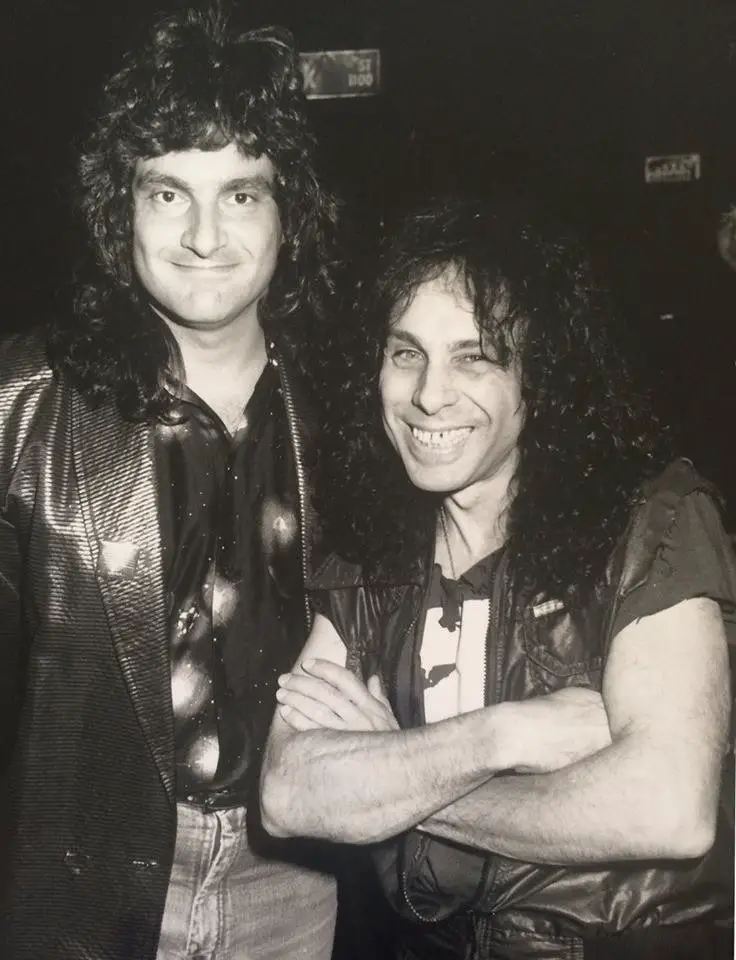
Andrew:
With all that being said, even with the credibility of the lineup, could you have ever imagined that Holy Diver would become one of the definitive albums in all of rock history?
Vinny:
Yeah, no, we never thought that. [Laughs]. As a matter of fact, I just got the award for Holy Diver going double platinum. It went double platinum this year, so it’s ironic, and I just got it a couple of days ago. It’s beautiful, and that was like a really special thing for me because that’s something that we started from scratch. When we did that album, we used to go into Sound City Studios at night around 7 pm, and that’s when we’d rehearse, and smoke a lot of pot. [Laughs]. It was like a hangout for us. We had the band there, and some of our friends would come down and hang out too. It was like a little party each night, and it was a really good time. We actually would look forward to going there each night, and that good energy was really reflected in some good songwriting, and some good songs being put together.
We did some crazy, crazy things there at Sound City, man. I mean, they let us do anything we wanted. We had it blocked out for like six weeks, and we destroyed all the candy machines, we would just bang on them and get candy if we were hungry. We broke all of them, and then, with all the pinball games, we opened them up too, so we couldn’t lose the ball. I mean, we did all this crazy shit like punch holes in the wall and stuff. [Laughs]. We were just doing what came naturally, and we just played really well together. We had Vivian Campbell on guitar and Jimmy Bain on bass, Ronnie and I, and then Angelo Arcuri, who recorded the first four Dio records, he was there too. He was my best friend, and he was the sound man for Sabbath at one point. It was like a hangout for our gang of friends and the band.
I remember when we went into the studio, what we did was we wrote four songs, and then we took all the gear right across the parking lot into the Sound City Studio. It was like a complex, and we just picked up the drums and cymbals – everything’s on the stand, there was no breaking it down – and we just carried it in, including Ronnie. [Laughs]. We carried all of that stuff in, so we could get set up, and record the four songs, work on them, and finish them. Then, we would go back to the rehearsal space and write four more. And that’s how we did Holy Diver. It was just a great time, with everybody having so much fun, and as Ronnie would say, “It was magic.” That magic we went in with, that made for a great album. And then when we started to mix it in the studio, my drum tech turned to me, and he says, “Holy shit. This is going to go platinum,” and I’m like, “Yeah, right.” Honestly, we had no idea. We just thought we were making a good record, and then it came out and it was just amazing. It really amazed us how it became so important in rock history. Even today, that album, it’s like the cornerstone of rock. When it came out, it sold and sold, and then it went platinum back then, and now to see it go double platinum, that’s pretty cool. It was just a moment in time when everything fell into place. Everything was right. Everything was loose. Everything was cool. It was a window of writing some great songs and having a great time.
Andrew:
Dialing back to Sabbath now. The lineup that recorded Mob Rules, Dehumanizer, and later, The Devil You Know, what was it that made the chemistry between you four so special?
Vinny:
Well, when I got into the band, like I said, they were in the middle of the Heaven and Hell tour in 1980. Then we got offered to do a song for the movie Heavy Metal, and like I was telling you, we had a couple of days off, we went to John Lennon’s house, and that’s where we pretty much put “The Mob Rules” track together. We wrote it and recorded it, and then a couple of days later, it was done. After we heard how great it sounded, that put the fire under everybody. We knew we sounded great live, but after recording that track, we knew that we just fit in great playing together. It’s crazy, I mean, Tony and Geezer are from Birmingham, England, I’m from Brooklyn, New York, and Ronnie was from Buffalo, New York, but we had the same feel. We just had to play together, and eventually, the groove was there. You know, I play a certain way, and with Sabbath, it just worked. Again, as Ronnie used to say, “It was magic.” With that band it really was magic.
That’s the thing with bands, it’s the people in the band that make it happen, you know? Like with Led Zeppelin and The Who, when those bands came out, it was just amazing with the original band members. I may not be an original member of Sabbath, and neither was Ronnie, but that version of Sabbath was totally different, and we were original members of that version. So, we ended up parting ways after Mob Rules, and Ronnie and me did Dio, but ten years later, we got back together, and it felt the same. We did Dehumanizer, and it was the same vibe. At the end of the day, I’m easy to work with, and there are no issues. If I need to, I speak my mind, but I’m easy to work with. I’m reliable, and that’s it. I think I’m easy to be in a band with, and actually, and so was Ronnie. And with Sabbath, everybody arrived on time or early for rehearsals, recordings, and stuff. There wasn’t any drama, or there wasn’t a lot of drama. We just showed up, and when it was time to make a record, we made great music together. We were just a good fit together. Then we got back together a couple of times after that as Heaven and Hell, and that was great too. It was always the same.
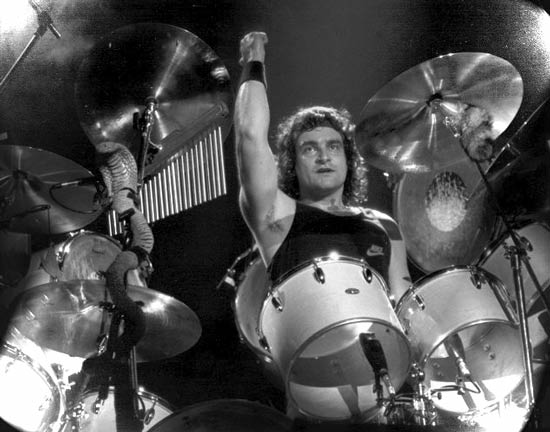

Andrew:
Of all the various musical projects you’ve been a part of over the years, Vinny, which one are you most proud of?
Vinny:
Well, I’m proud of them all. I’m proud that I got to play with Sabbath. I mean, who wasn’t influenced by Sabbath? I am proud that I got to be a part of that special piece of rock history. But I think the Holy Diver era of Dio was my favorite because we started something from scratch. When we started that, it was Ronnie and me, and Ronnie would play bass, and I would play drums. We go to a rehearsal studio – I think we’d even rehearse in Ronnie’s garage – and we had the first early sounds of Holy Diver. We’d jam on that and try different things, and that all led to great success. It led to big tours and it led to starting something that became huge over the course of many albums, across many years. To me, that’s a great story, and it means a lot to me that I was a part of starting that. To this day, they’re still selling copies of Holy Diver to the point that it just went double platinum, and it’s something to be proud of. So, I’m very proud to have done that with Ronnie and to have been a big part of that. I went from Sabbath, who is a huge part of rock history, to Dio, making this album that became legendary, and a part of rock history. So, that’s pretty good for a kid from Brooklyn. [Laughs].
Andrew:
I’ve got one last one for you, Vinny. I asked Carmine this same question a while back, and now I’ll need your take too. Who’s better at the drums? You or Carmine?
Vinny:
Oh, no contest. I’m better. [Laughs]. Carmine is the original but I’m the new original, and I’m faster, and a lot louder. I’ve got a lot more power. [Laughs]. I used to have my first website where it said “Vinny Appice: The Loudest Drummer In Rock. No Love Songs. No Acapella. No Ballads. No problem.” Carmine saw it, and he said, “Yeah? Well, shit, no work either.” [Laughs].
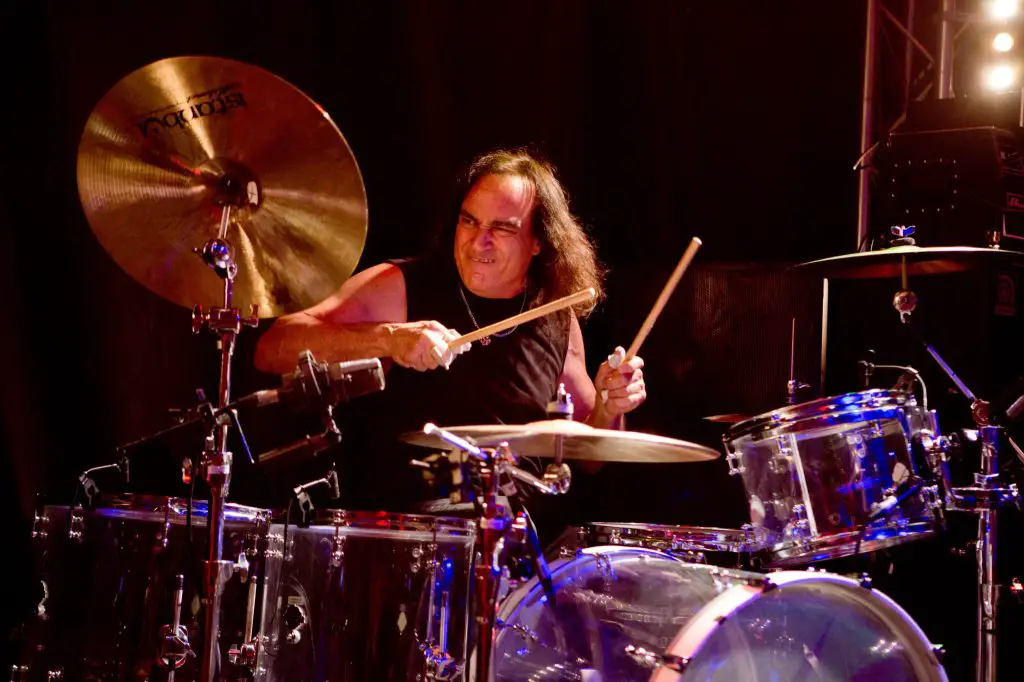
– Andrew Daly (@vwmusicrocks) is the Editor-in-Chief for www.vwmusicrocks.com and may be reached at andrew@vinylwriter.com
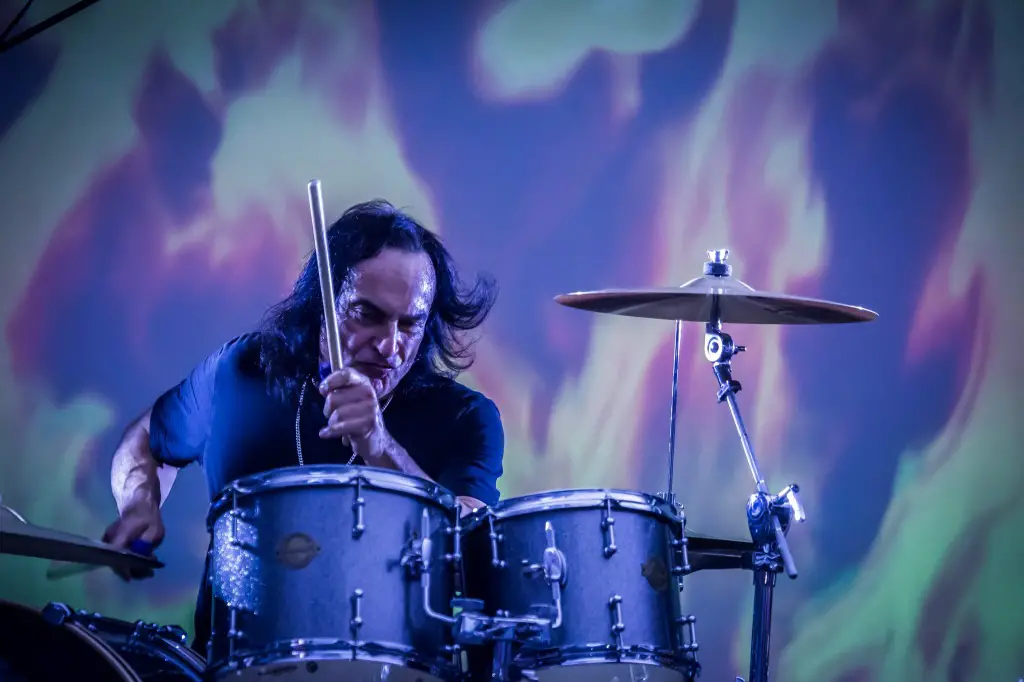




Leave a Reply